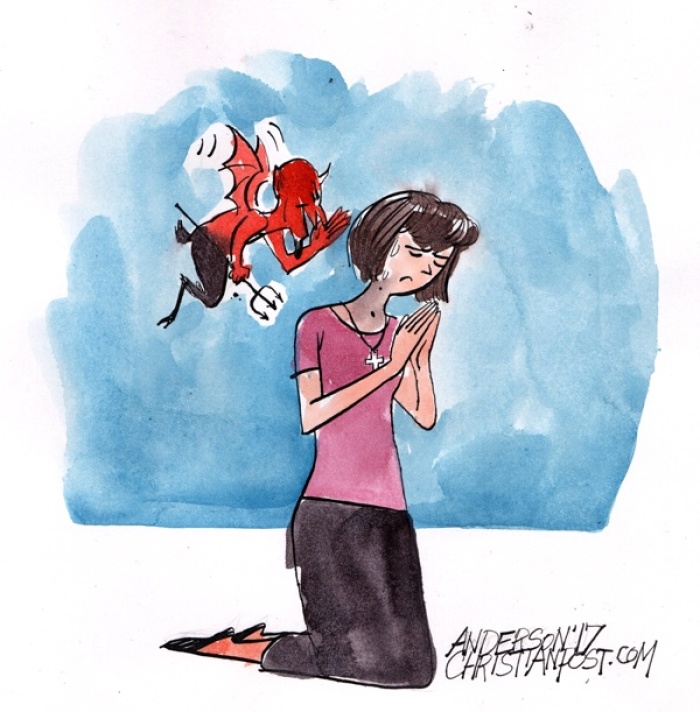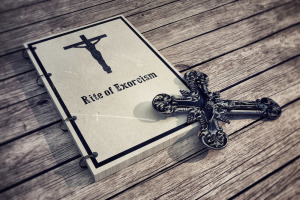The Christian and Demon Possession

Our Western conception of the world is far too shallow. We don't reckon with the spiritual realities that mark the world in which we live. This is especially true when considering the existence and activity of demons. If C.S. Lewis was right, we may err in two ways: either to deny their existence or obsess over them in an unhealthy way. Many people in our culture err on the side of the former. We reduce reality to the things we can see and touch, and you won't meet many people who will claim to have seen and touched demons.
But demons are real. Satan and his kingdom of darkness is real. Christians actually struggle "against rulers, against the authorities, against the cosmic powers of this present darkness, against the spiritual forces of evil in the heavenly places." (Ephesians 6:12) Christians actually do have an adversary who roams around like "a roaring lion, seeking someone to devour." (1 Peter 5:8) It's high time we start taking the forces of darkness seriously.
But taking the forces of darkness seriously only raises tough questions. For example: what should we think about the Christian in relation to demons? More to the point: Can the Christian become demon-possessed?
Demonic Forces Exist in a Domain of Darkness
Part of the initial problem in answering this question is that our ideas about demons and demonic activity are often unbiblical. We tend to think of the world as a neutral place, in which people and demons coexist. In this conception of the world, a person is not under demonic influence until he is. But this is not how the world is depicted in Scripture. In the Scriptural view, this now-fallen world is far from neutral; it has a "god." (2 Corinthians 4:4) People are born into a hostile environment. They're born into a domain of darkness (Colossians 1:13), which is ruled by oppressive, demonic authorities.
If this is the case, then the way we think of demon-possession must change. Concentrated demonic influence over people isn't a crazy occurrence that goes against the grain of the world. "Possession" is simply an example of the demonic forces' chosen exercise of authority at any given moment. The people who live in the domain of darkness who are "demon possessed" and those who are not are, in a sense, in the exact same boat: both are equally unprotected from demon possession. In other words, any person who lives in the domain of darkness is "demon-possessable." Put simply, if we are an unbeliever, demons can get us. This can only happen with God's permission, of course, but the principle stands: the unbeliever has no Christ, no Savior, to protect them. They are vulnerable. How awful.
Christians Have Been Transferred Out of the Domain of Darkness
Praise God, the same is not true for the believer. To the question posed earlier, "Can demons possess the believer?" We have an emphatic answer: "No". Christians cannot be possessed by demons in the way described throughout the Scriptures. They cannot be dominated by demons because they no longer belong to the domain of darkness. If you are a Christian, the Father reached down into the domain of darkness, grabbed you by the scruff of your neck, picked you up, and gently placed you into the kingdom of his beloved Son (Colossians 1:13). The Gospel is the Triune God's rescue mission of his people who were trapped in the domain of darkness.
But this rescue mission isn't merely an extraction. It's not as if Jesus were planning to take his people to some sweet by-and-by, leaving Satan and his forces to ravage the rest of the earth to their hearts' content. The world, in bondage to sin and under the enemy-occupation of Satan, has been invaded by Christ. From the very beginning of Mark, we see Jesus, like the nation of Israel in the book of Numbers, driven by the Spirit into the wilderness for 40 days (Mark 1:12-13). And what does he do as soon as he emerges? The same thing Israel did when they emerged from their 40 years in the wilderness: he "invades Canaan." His announcement that the "kingdom of God is at hand" (Mark 1:14-15) is both good news for those whom he came to rescue and recruit (Mark 1:16-20), and bad news for the demonic movers and shakers whose doors he came to kick down (Mark 1:21-28).
Here's the takeaway: our focus is not on figuring out tips and tools for exorcism. Our focus is on preaching the Gospel, which is the power of God unto salvation, and the means by which the Spirit of God takes up residence in the believer.
The Gospel in Demonic Perspective
Jesus protects his people, in sum. We see this in John's Gospel. The Father sent the Son by the power of the Spirit to penetrate the satanic lines of defense and free his oppressed people (John 1:9-18). This he did by shedding his blood on the cross, thereby paying the penalty of their sin. This blood payment takes away Satan's power over the believer(Colossians 2:13-15; Romans 8:31-39). Christ also gives the church the gift of his Holy Spirit (John 7:39; 16:7), recruiting them to be a Spirit-empowered extension of that same mission (Matthew 28:18-20; John 17:18; 2 Corinthians 20:21). This is why we can be absolutely certain that Christians cannot become inhabited by demons. The Holy Spirit has taken up residency in them (Romans 8:9-11). There's no room for demons.
In Matthew 12:43-45, Jesus warns about the danger of seeing demonic exorcism as an end in itself. It's not; a demon can still overtake an unbeliever, even if an exorcism has happened. But what happens if the demon comes back to find that his previous home is now a Christian? What the demon now finds is not a house neatly prepared for him, but rather an impenetrable fortress, with divine weaponry pointed right at him. The Spirit indwells us. That's what every true Christian has become: a dwelling place uninhabitable for demons.
Jesus has not finally rid this world of demons. At present, we still wait for the final arrival of the kingdom and all of its promises (Hebrews 4:2). As believers, we feel the presence of this evil domain around us daily. In this sin-cursed world, demonic bullying still happens. As we wait, furthermore, we struggle not against flesh and blood, but the spiritual forces of darkness. Yet, we ought never to be overcome with fear. Demons cannot take us over. Satan cannot un-save us. Our spiritual warfare is ongoing, but we know how this story ends.
Samuel G. Parkison is a PhD student at Midwestern Baptist Theological Seminary. He lives in Kansas City with his wife (Shannon) and their two sons (Jonah and Henry), where Samuel serves as a Pastor of Teaching and Liturgy at Emmaus Church. You can follow Samuel on Twitter at @samuel_parkison




























